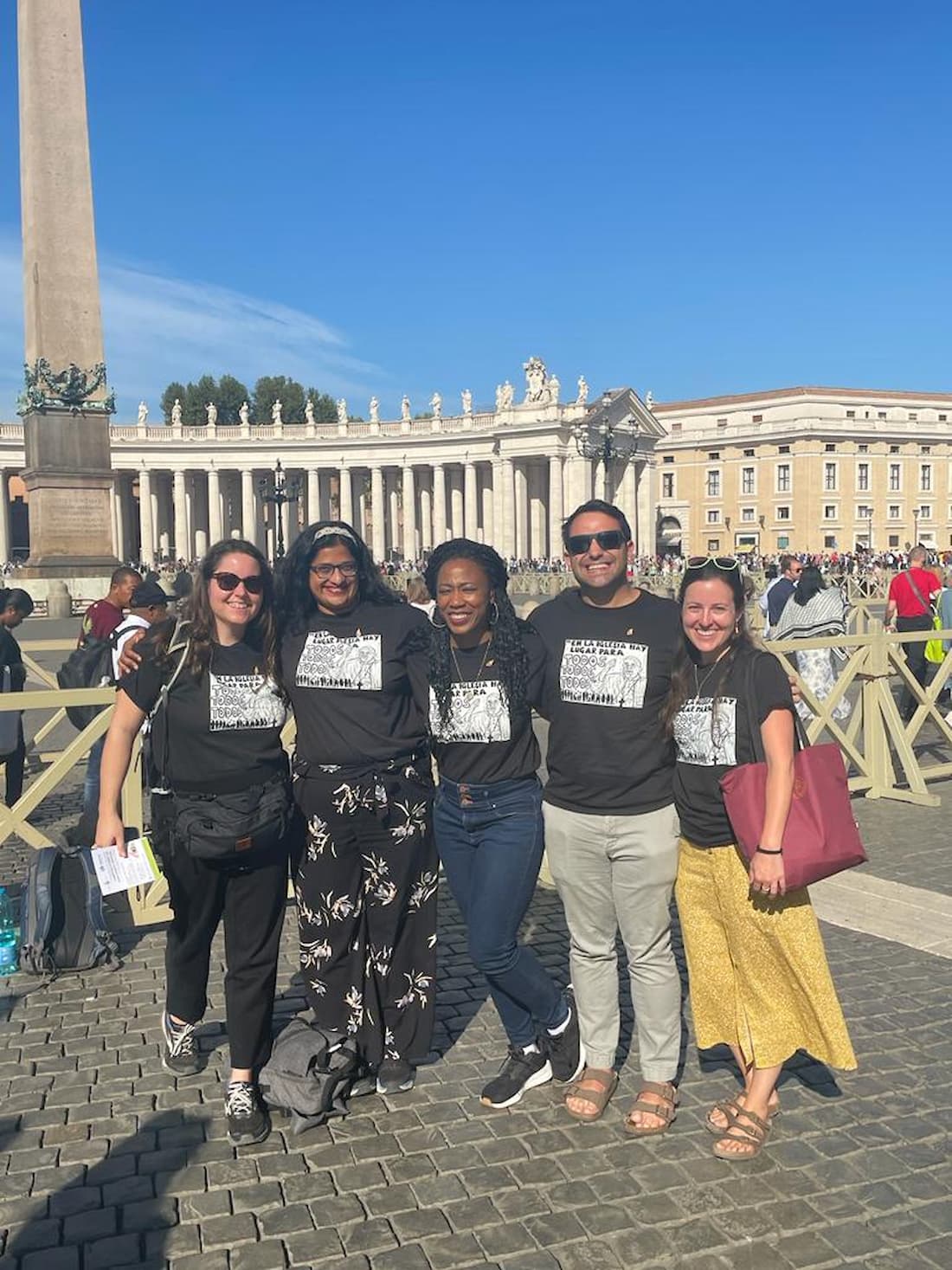
CSTM Affiliations, L-R: Anna Robertson, JoAnn Lopez, Kayla August, Anthony Russo, Katie Dorner
I recently returned from a young adult pilgrimage to Rome for the opening of the 16th Ordinary General Assembly of the Synod of Bishops: “For a Synodal Church: Communion, Participation and Mission.” Our group of 16 young adults was led by Discerning Deacons, a project engaging the Catholic Church in the active discernment around women in the diaconate. Also on the pilgrimage from CSTM was Kayla August, a student in our Ph.D. in theology and education program, who is focused on preaching as a form of education, as well as three CSTM alumnae: Katie Dorner (M.A./M.S.W. ‘17), director of human concerns at Gesu Parish in Milwaukee; JoAnn Lopez (M.Div. ‘15), director of faith formation at St. Basil’s Catholic Parish in Toronto; and Anna Roberston (M.T.S. ‘16), director of distributed organizing at Discerning Deacons.
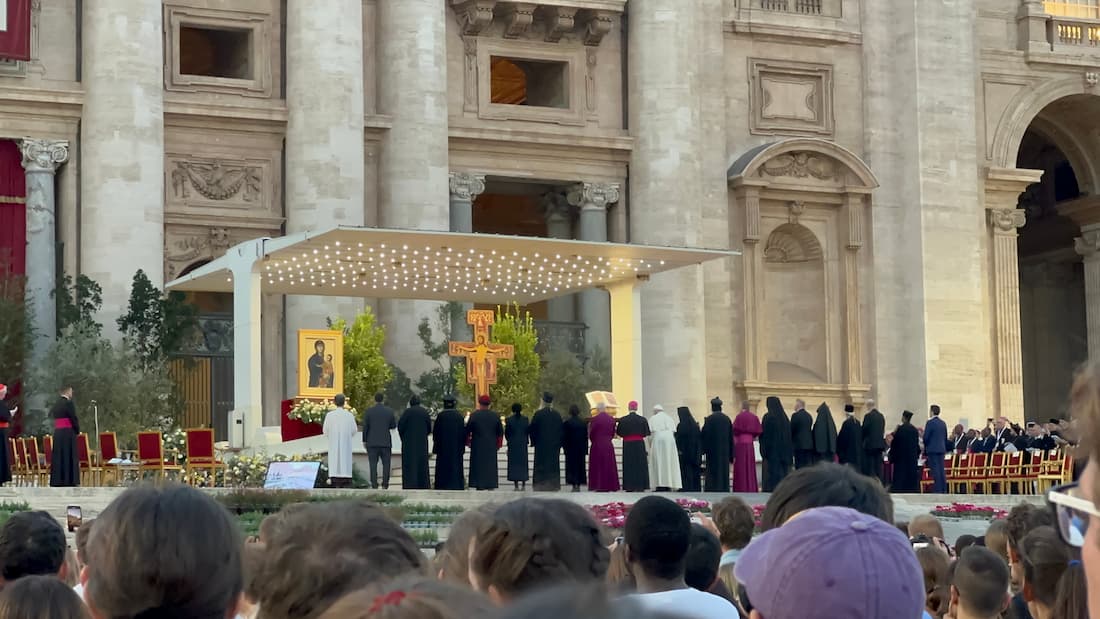
Our pilgrimage started with participation in the Together gathering with young adults from around the world, sponsored by Taizé. This gathering had several movements to it: 1) an opening session with Cardinal Jean-Claude Hollerich, relator general of the synod; Sr. Nathalie Becquart, XMCJ, undersecretary of the Synod of Bishops and a student in the License in Sacred Theology program at CSTM; and several voting delegates of the synod. During the session, young adults participated in the “conversations in the Spirit” methodology that will be used during the synod and were able to ask questions of the delegates; 2) a variety of workshops on various themes related to synodality, ecumenism, and the church in the world today (I attended one on the German Synodal Path); and 3) an ecumenical prayer vigil led by Pope Francis and 19 leaders from the full family of Christian churches. This vigil marked the first ecumenical prayer vigil before a synod, the first time ecumenical religious leaders met in Rome, the first time they were all sitting at the same level with each other and the people of God, and the first time they all entered the altar together. This vigil was, without a doubt, the most impactful ecumenical experience I’ve ever had.
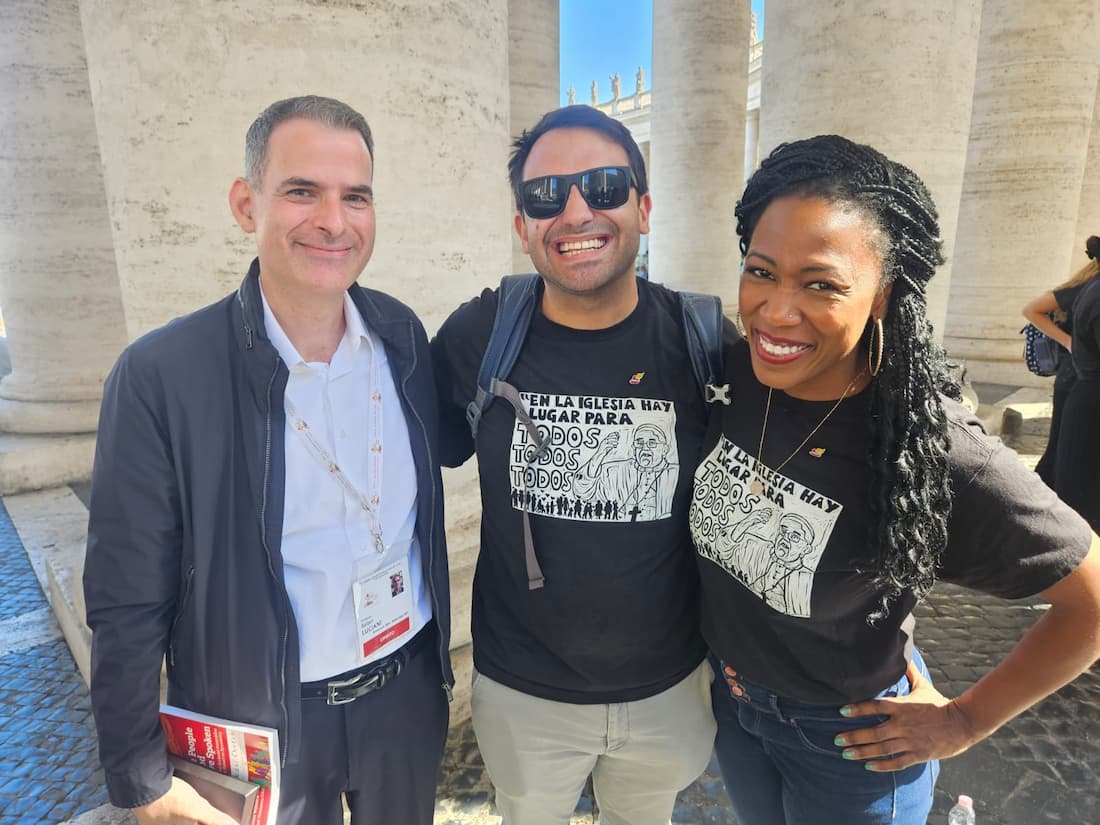
Rafael Luciani, Anthony Russo, Kayla August
In the days that followed, we kept a busy schedule: touring the Catacombs of Priscilla and the Vatican museums; meetings with representatives from WUCWO, the World Union of Catholic Women’s Organizations, and WWO, the Worldwide Women’s Observatory; taking a day trip to Assisi on October 3, the Transitus of St. Francis; and, perhaps most significantly, the opening mass of the synod in St. Peter’s Square. Along the way, we encountered at least 20 voting delegates of the synod and prayed with them, asking for their intentions for the month ahead. We also ran into CSTM’s own Rafael Luciani, associate professor of the practice,
who is serving as a theological expert for the synod.
While each of these experiences warrant reflections of their own, I’ll consider them collectively in light of key takeaways from this pilgrimage at-large:
Come, Holy Spirit
“We stand before You, Holy Spirit, as we gather together in Your name. With You alone to guide us, make Yourself at home in our hearts.”
Frequently throughout the pilgrimage, we prayed the Adsumus, Sancte Spiritus prayer, typically through song in the style of Taizé prayer – asking for the Holy Spirit to be received in our hearts and the hearts of the synod’s delegates. Pope Francis, in his opening remarks, reminded participants that the Holy Spirit is the protagonist of the synod, not us. As humans, we all have issues about which we’re most passionate, as well as hopes for how our church and world might be more inclusive, compassionate, and just. In naming the Holy Spirit as the synod’s protagonist, delegates (and all of us) face the challenging task of deepening their gaze past their own “agenda” (no matter how righteous) and toward the Spirit. I don’t think this means, however, that we need to let go of our dreams for our church. Rather, openness to the process of the synod might reveal dreams more expansive than our individual imaginations alone might allow.
During the opening gathering of Together, Cardinal Hollerich referenced Pope Francis when he noted that when the Spirit is acting, first there is “big confusion” and from that comes a “new harmony.” He added notes to keep in mind while discerning the movement of the spirit:
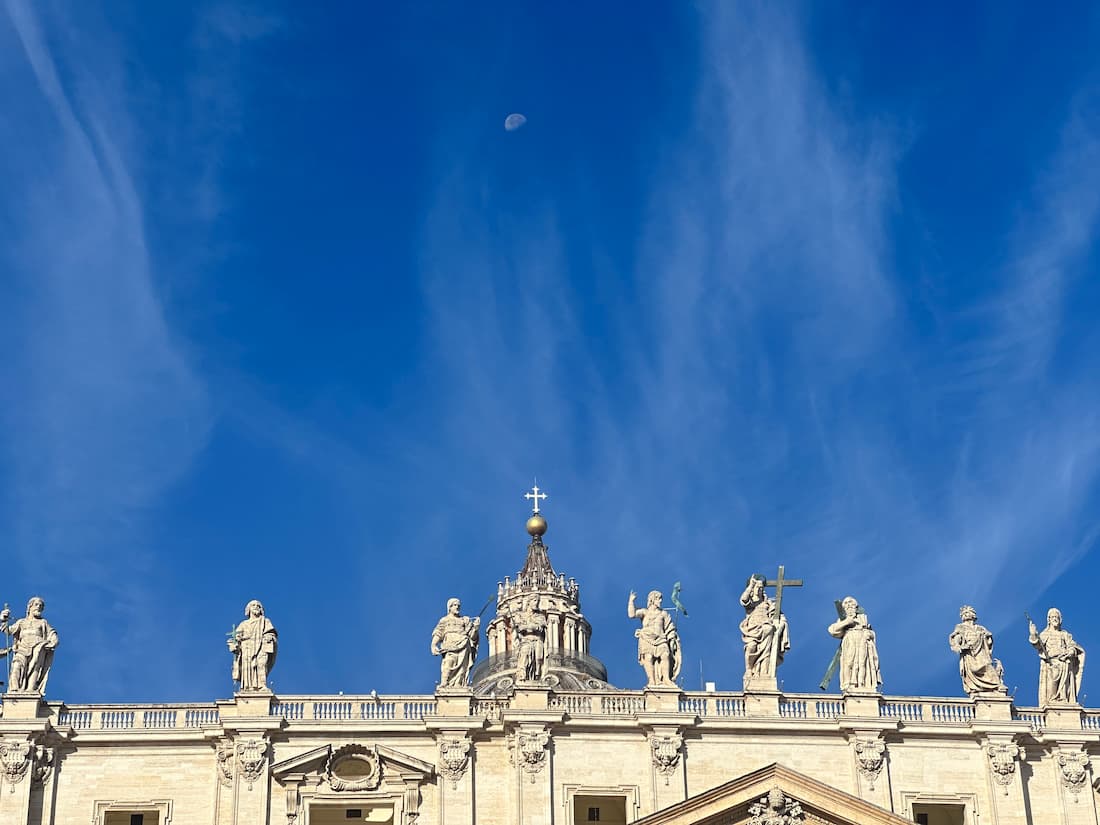
1. If we are led by the Spirit, we might see not only an “A” and “B” option, but a new possibility: “C”.
2. The synod will undoubtedly come with tensions – this is not contrary to the Spirit.
3. Though, without joy in our heart at the end, we are far from the Spirit. At its core, this synod is about what it means to be church. Journeying together toward this new way, led by the Spirit, is a journey into the unknown. It will require trust and a lot of listening, but I believe it’s the only way
to make dreams into reality.
Countercultural keys to synodality
Attentiveness to the Spirit requires a number of dynamics that are fundamentally counter to some of the most pervasive aspects of our rapid, technocentric, and individualistic culture. Additionally, “big confusion,” noted above, is typically something we run from, not towards. I offer a few “keys” to synodality here:
Silence
In his remarks at the ecumenical prayer vigil, Pope Francis noted: “In a world full of noise, we are no longer accustomed to silence; indeed sometimes we struggle with it, because silence forces us to face God and ourselves. Yet it lies at the foundation of the word and of life.”
Synodality and a listening church depend on silence, opening ourselves to the ways God is speaking to us and through us – particularly making space for the voices that have historically been silenced and excluded from the culture of community to which we are called as people of God. Can we turn our phones off for long enough to listen?
Restlessness
Referencing an insight from Cardinal Mario Grech, Secretary General of the Synod of Bishops, a synod representative stressed the importance of restlessness, saying that it is a gift to be cultivated – opening us up to the work of the God of surprises through the Spirit. In a similar way to silence, a feeling of restlessness is typically one we seek to quickly resolve. Rushing through restlessness is where resistance to the synod has/will come. We all would benefit from paying attention to the barriers to restlessness within us.
Questions, not Answers
At several points throughout our pilgrimage, we were reminded that the Instrumentum Laboris (working document) for the synod offers questions, not answers – which is not the norm for the Vatican! And we were urged to be wary of Christians who have an answer to everything. By design, this synod is process-focused, not outcome-focused. For the last year, and through next October’s assembly (and beyond), the church is called to consider who and how it is (we are) called to be. The people of God, in the fullness of our diversity, are invited to live these questions together.
Are we ready to do so?
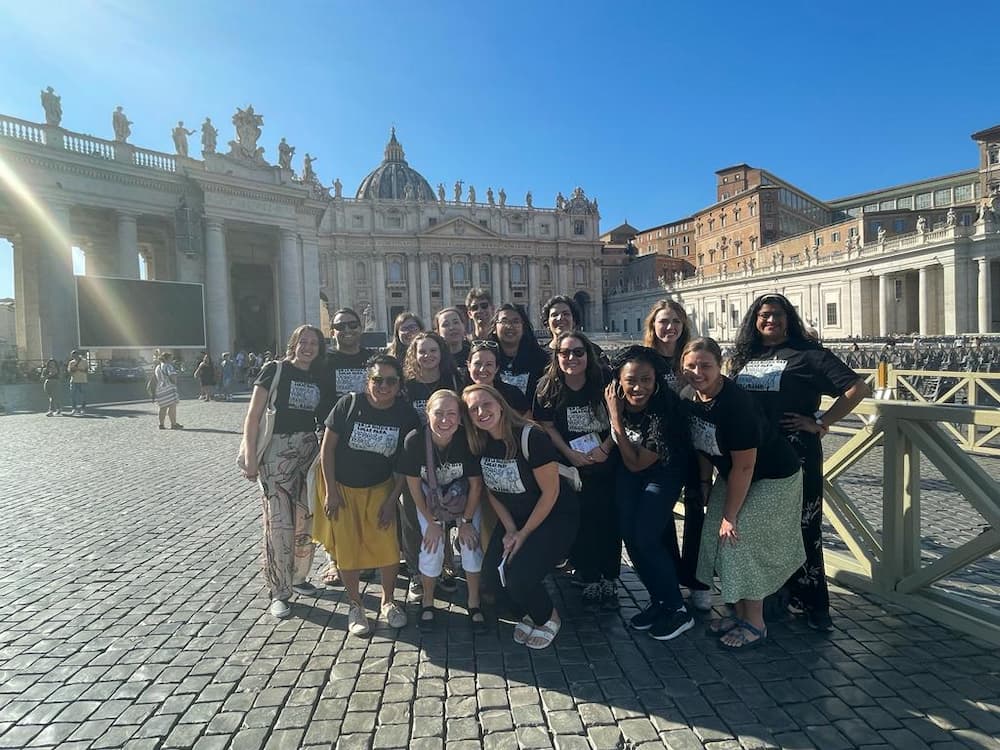
Full Delegation


